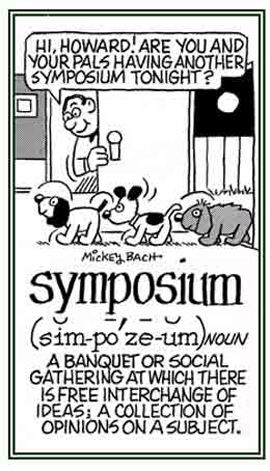syn-, sy-, sym-, syl-, sys-
(Greek: with, together with; also by extension: united; same, similar; at the same time)
symbolize (verb), symbolizes; symbolized; symbolizing
1. To represent something by means of some mark or figure: The sign ahead next to the street symbolizes the right of way for the car to proceed ahead of another car.
2. To express indirectly by an image, a form, a model, or to represent something: For many people, flowers symbolize love and affection for someone.
2. To express indirectly by an image, a form, a model, or to represent something: For many people, flowers symbolize love and affection for someone.
Mr. Bright told his students to draw a picture for each word in the list to symbolize it!
symbolizer
A general mechanism by which some mental representation comes to stand for some other thing, class of things, or attributes of something.
symbolomania
An excessive use of symbols or having symbolical meanings attached to one's acts or words.
1. An apprehension that one's speech or behaviour could embody symbolic meanings: Joyce, afflicted with symbolophobia, had to be very careful of what she said at the dinner party because she was really afraid that someone could misinterpret what she said and give another implication to it.
2. A hatred of symbols or icons: Robin, troubled with symbolophobia, didn't get along with the representation of things, like logos or emblems, because she could never understand or make sense of them.
2. A hatred of symbols or icons: Robin, troubled with symbolophobia, didn't get along with the representation of things, like logos or emblems, because she could never understand or make sense of them.
symbrachydactylia
The existence of fingers that are abnormally short and partially united with webbing.
1. Fighting together or in an alliance with an ally (or allies).
2. Fighting jointly against a common enemy.
2. Fighting jointly against a common enemy.
symmelia
An abnormal bodily condition in which there may be three feet (tripodial sympus), two feet (dipodial sympus), one foot (monopodial sympus), or no feet (apodal sympus or sirenomelia).
symmelus
A fetus with symmelia which is a developmental anomaly or the absence, deformity, or excess of body parts as the result of faulty development of the embryo which is characterized by the apparent fusion of the lower limbs.
symmetric
1. A reference to having a similarity in size, shape, and a relative position of corresponding parts.
2. Affecting corresponding parts simultaneously; such as, certain diseases.
2. Affecting corresponding parts simultaneously; such as, certain diseases.
symmetrical
1. Descriptive of being characterized by or exhibiting symmetry; that is, well-proportioned, as a body or whole.
2. A reference to being regular in form or arrangement of corresponding parts.
2. A reference to being regular in form or arrangement of corresponding parts.
sympathic
1. Characterized by, proceeding from, exhibiting, or feeling sympathy; sympathizing; compassionate: "She was a sympathic listener."
2. Acting or affected by, of the nature of, or referring to a special affinity or mutual relationship; congenial: "With their many similar tastes, she found her sister a most sympathic companion."
2. Acting or affected by, of the nature of, or referring to a special affinity or mutual relationship; congenial: "With their many similar tastes, she found her sister a most sympathic companion."
A meeting or conference for the discussion of a topic or special subject: A symposiac used to be a convivial meeting for drinking, music, and intellectual discussion among the ancient Greeks.
At the symposiac, or symposium, the audience is made up of the participants who make presentations and at which there is also a banquet.
symposiarch
symposiast
A participant in a symposium (a formal meeting held for the discussion of a subject, during which individual speakers may make presentations).
1. A conference or meeting where academics or experts have discourses about certain subjects: At the symposium, professionals delivered speeches about topics in their special fields of knowledge.
2. A social get-together of people where they can talk freely about their ideas: Once a month Jerry took part in a symposium where he met his friends and had conversations about intellectual topics.
3. A jovial and merry party with light talk and music: For her birthday, Rebeca wanted a symposium for her twenty-fifth celebration.
4. Etymology: from Greek sumposion, "a drinking party" from Latin symposium; from syn, "together" + posis, "a drinking."

© ALL rights are reserved.
Go to this Word A Day Revisited Index
2. A social get-together of people where they can talk freely about their ideas: Once a month Jerry took part in a symposium where he met his friends and had conversations about intellectual topics.
3. A jovial and merry party with light talk and music: For her birthday, Rebeca wanted a symposium for her twenty-fifth celebration.
4. Etymology: from Greek sumposion, "a drinking party" from Latin symposium; from syn, "together" + posis, "a drinking."



